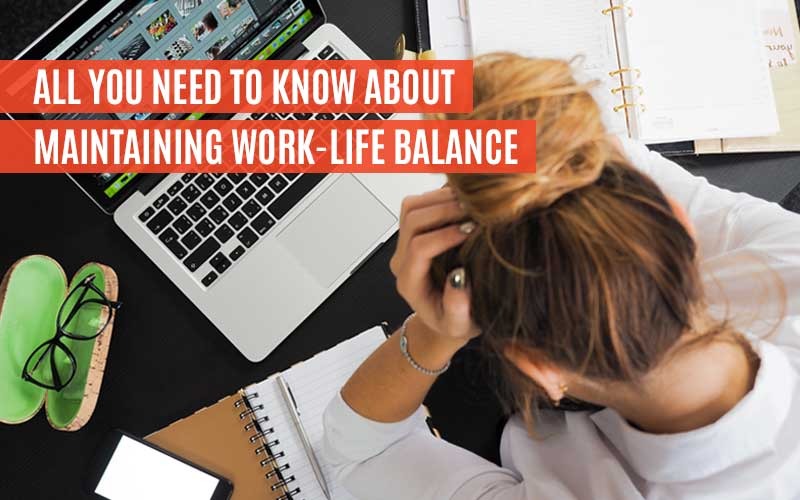
All you need to know about maintaining work-life balance
Irrespective of the nature of the job you’re involved in, it won’t be wrong to say that the world around us has gotten ‘busier’. The hustle culture is real and every working professional wants to get ahead in the race and tick off their life goals as soon as they can. It’s true for a corporate employee, as it is for a govt. official, a freelancer, or a business owner. But here’s the thing about the ‘busy’ schedule that we all seem to abide by – our quality of life deteriorates to the extent of the burden we take on in our professional roles. This is why balancing a healthy work-life balance is so important.
In a world where mental health issues, poor diet maintenance, and a sedentary lifestyle takes precedence, work-life control becomes a key factor in course correction and adopting a self-care approach. We've all experienced the feeling of pressure building up in our work and taking over our days. On the other end of the spectrum, you may be familiar with the feeling of unmet aspirations and wishes. They gradually entice people into a mood of dissatisfaction and detachment.
But what is
the way out of this toxic cycle and avoid the feeling of mental tiredness that
seeps into your personal lives?
The key is to identify and evaluate what matters to you most in your personal life and prioritize them amidst the busy schedule that you keep. Work-life balancing is a term used to imply a trade-off. You strike a balance between the time spent with family, friends, and personal hobbies.
Balancing life between work and personal cycles can get tricky. However, a clear focus and will to persevere will pave the way for you.
Here are a couple of things you need to get started on (if you haven’t already) -
- Focus on only the important aspects of your life – it’s not possible to control everything under the sun, and the good news is you don’t need to
- Practice the art of discipline in your life – be it work or personal, commit to a disciplined lifestyle that will allow you to minimize delays, procrastination, and missed opportunities
- Keep
your work life separate from your personal life – this means not opening your
work emails in the bed; at the same time, it also implies you schedule your
personal obligations after work hours. Of course, you may need to make
exceptions at times, but make sure they don’t form into a routine
- Prepare
a list of personal goals that you wish to achieve on weekly basis – it could be
catching up with friends & family, shopping for your home, attending to
your hobbies, etc.
- Prioritise making plans with your family more often – this one may seem obvious but it’s easy to take our family for granted in between a hectic work schedule. This strains our relationship with our loved ones and affects our productivity and mental health as well.
However, in doing so involves making difficult decisions – which necessitates guts, mental fortitude, and endurance. I've discovered that in order for your intellect to be willing to make these difficult decisions, you must first realize WHY. So that it can participate fully (both consciously and subconsciously). It is what will motivate you to take courageous action.
There is also a misconception that work-life balance is something only (or largely) women want. But this is not the case. Men, like women, appreciate (need) moderation. The distinction is that they employ different languages.
Reasons Why Maintaining a Work-life Balance Is So Important
Now that we've clearly established what work-life balance is and who it's intended for, let's look at why it's important.
- Leads to lesser stress
- Promotes mental health
- Enables you to live in the present
- Motivates you to think outside the box
The
biggest struggle that keeps people from adopting a healthy work-life balance is
that they don’t feel like they have an alternate option. But that's not quite
correct. You need to realize that your decisions ultimately decide the course
of your work-life balance.
Here are some habits you may start implementing to overcome mental fatigue –
- Say no to activities that aren’t your priority.
- Offload anything that can be delegated. Remember, you don’t have to do everything on your own.
- Choose one activity at a time, based on what is needed to be completed first.
- Maintain a planner to help you plan your activities for up to a week ahead.
Once you start following these, you’ll notice that you’re able to manage your workload more efficiently without draining yourself out. And it will significantly reduce your tension and anxiety levels.
The majority of us devote a considerable portion of our time to work. We let it seize over and pervade every area of our existence. With this in mind, it is critical to strike the appropriate balance and execute it in your job. This will enable you to disconnect from work and devote an adequate amount of time to your personal lives.
Disclaimer: The opinions expressed in this article are those of the author's. They do not purport to reflect the opinions or views of The Critical Script or its editor.

Newsletter!!!
Subscribe to our weekly Newsletter and stay tuned.

















Related Comments